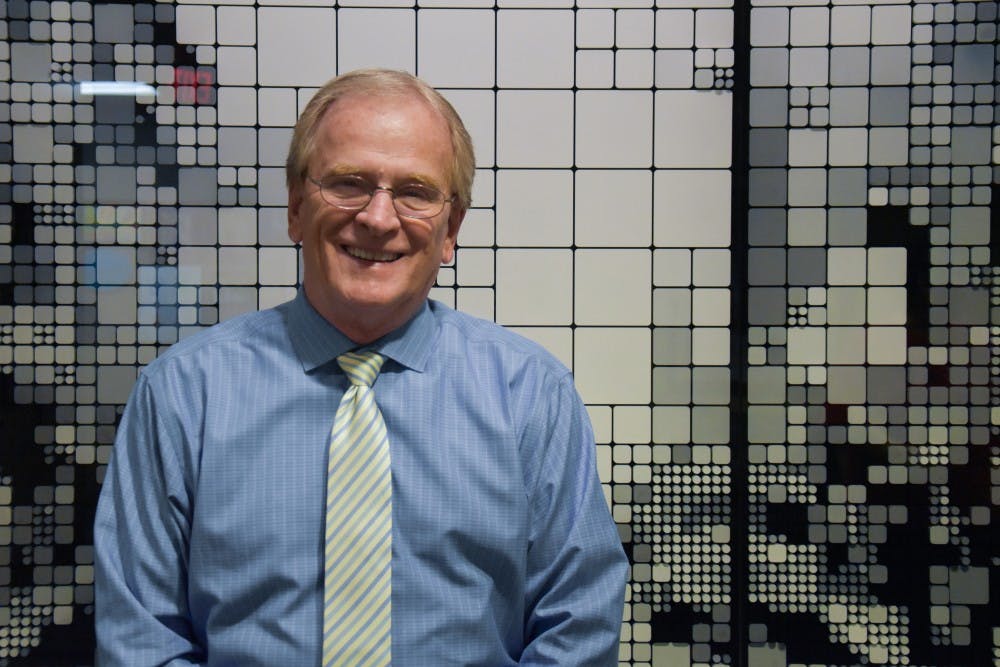"Five Minutes with the Mayor" is the second Tuesday of every month.
The City of Muncie is working to close the disconnect between the people and government with its monthly "Five Minutes with the Mayor" program, which gives locals the chance to have a one-on-one dialogue with the city’s executive branch.
The program was created shortly after Mayor Dennis Tyler took office in 2012 after he realized that town halls weren’t always fostering meaningful conversation.
“What I found was a lot of good people weren't comfortable in that setting,” Tyler said. “Consequently, what ends up happening then is those good people never get the opportunity to be heard."
All topics are open for discussion at the meetings and Tyler said that they have had as many as 15 people attend to the monthly sessions.
"What I usually find out is that it's very difficult if you don't know how to navigate the system in government,” Tyler said, comparing it to getting behind in school and trying to get caught up. “We've tried to make it easy and what I’ve found is that 80 to 90 percent of the issues people bring to me I can fix in one phone call."
The Daily News took part in a one-to-one meeting on the second floor of the town’s City Hall with Tyler on May 10 to talk about Muncie’s relationship with Ball State, the downtown area and job creation.
Ball State
Tyler described the relationship between the city and the university as "pretty good" and said that is much better today than it was years ago.
"Could it be better, yeah sure, and there is still work to be done," he said. "To me the challenge is encouraging the board of trustees to be more progressive towards the city."
Tyler said that he recently heard from several Muncie locals and Ball State students that the community wants to have a live, work and play area downtown.
He believes this could help keep students happy while having them in an area where they could be creative and bring along more arts and culture.
"To me that's a win-win for Ball State and it'd be a win-win for us too later on down the road,” Tyler said. "Why doesn't Ball State throw in the money to build them and we will tax abate them for a period of time."
Another issue the mayor would like to see addressed is the condition of the neighborhoods around the university.
Recently, Tyler drove around the University of Dayton and realized how nice the neighborhoods surrounding the campus looked.
"They're nothing like they see off campus around Ball State that are dumps," he said.
He talked to the mayor of Dayton about it and found out that the city and university worked together to help create overlay districts, penalties and hire an enforcement team to encourage students to take care of their property.
“Here the university just puts their head in the sand and say 'they’re not on campus so they're not on ours',” Tyler said.
Marsh closings and job creation
The possibility of all 44 Marsh Supermarket locations closing if the company doesn’t find a buyer or business partner is a major concern for the mayor.
"That will create food deserts,” Tyler said. “You have people who may not have access to a vehicle who have to take a bus to get some place to buy groceries and that’s pretty concerning.”
The challenge for Muncie is how to attract businesses to come in and break the “cycle of food deserts” and understanding what drove the market away in the first place, he said.
On the topic of job creation, the mayor believes government has an important role to play.
“[Some people say] that cities have no role in job creation. In a perfect world maybe they don't, but we aren't working in a perfect world today," Tyler said. "How can I say 'no that's just a private issue,' because the more jobs I can create for my citizens, the better off we all are."
He thinks a training program is one way to attract businesses.
“If you can put together a training program that you can show the manufactures and the employers that this thing can really work – my guess is you could probably get them to buy into it and support it financially," Tyler said.
Downtown
The mayor believes a vibrant downtown is essential if the city is going to be successful and is confused as to why past administrations decided that economic focus should be on the northeast side of Muncie around the mall.
“I don't know who thought that up," he said, "but that was nuts."
Tyler remembers when the downtown area was a “ghost town” and said it’s made a lot of progress since then with new businesses opening, a hotel being built and events being hosted in the area.
The mayor believes there is plenty of potential for growth by getting students and faculty at Ball State involved with Muncie’s downtown.
"There is not enough students and faculty coming off campus, but Ball State could do a lot to encourage that," Tyler said.
In his view an increased investment by the university with some of the initiatives in the area could bring to downtown. He thinks there is a desire from young people to get involved and said “they want to be a part of it."





